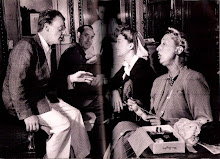 I just recently watched the 1933 James Cagney movie The Mayor of Hell, and it was very dramatic. James Cagney was good as Patsy Gargan, the racketeer-turned-deputy commissioner of a corrupt reform school; however, we don't see very much of him in the movie. Of course, he falls in love w/ the school's nurse but this is minimized to a great extent in the film.
I just recently watched the 1933 James Cagney movie The Mayor of Hell, and it was very dramatic. James Cagney was good as Patsy Gargan, the racketeer-turned-deputy commissioner of a corrupt reform school; however, we don't see very much of him in the movie. Of course, he falls in love w/ the school's nurse but this is minimized to a great extent in the film. At first, things are bad in the reform school: the fat warden Thompson eats big plates of bacon and eggs while his charges eat Oliver Twist-style gruel; later, he'll decree an effective death sentence against a tubercular boy by putting him in the hole on a cold night. The film does a delicate balancing act throughout: the system is flawed because corrupt men are involved in running it, but not everyone involved in running it is corrupt. Some kindly guards give up their coats in an attempt to keep the boy warm, and the nurse argues for their welfare on every opportunity.
At first, things are bad in the reform school: the fat warden Thompson eats big plates of bacon and eggs while his charges eat Oliver Twist-style gruel; later, he'll decree an effective death sentence against a tubercular boy by putting him in the hole on a cold night. The film does a delicate balancing act throughout: the system is flawed because corrupt men are involved in running it, but not everyone involved in running it is corrupt. Some kindly guards give up their coats in an attempt to keep the boy warm, and the nurse argues for their welfare on every opportunity. One such opportunity arrives in the form of Cagney, who soon becomes head of the reform school while the former headmaster leaves for a while (on a vacation) and has the kids set up a self-government, which I admire him for. Yet, he soon leaves the school to take care of his own mobster affairs (with the intention of coming back), making the kids feel abandoned and back under the sadistic clutches of their ex-headmaster. Then Cagney goes on the lam after wounding one of his rivals and hangs around his hideout in another state, constantly sending his sidekick—the immortally funny Allen Jenkins—to check on the guy (because you see, if the guy dies, Cagney will go to jail and the reformatory will remain in its sadistic status quo).
One such opportunity arrives in the form of Cagney, who soon becomes head of the reform school while the former headmaster leaves for a while (on a vacation) and has the kids set up a self-government, which I admire him for. Yet, he soon leaves the school to take care of his own mobster affairs (with the intention of coming back), making the kids feel abandoned and back under the sadistic clutches of their ex-headmaster. Then Cagney goes on the lam after wounding one of his rivals and hangs around his hideout in another state, constantly sending his sidekick—the immortally funny Allen Jenkins—to check on the guy (because you see, if the guy dies, Cagney will go to jail and the reformatory will remain in its sadistic status quo).
In many ways, the film is decades ahead of its time. Not only does the black kid (who is never depicted differently than the others) feature heavily in the narrative—he becomes the defense attorney at a trial in the school's courtroom for when one of the charges steals a Hershey's® Chocolate Bar (I guess that means Warner Bros. got permission from the Hershey Company for product placement)—but Miss Griffith (the nurse) is an amazingly strong female character. At Cagney's behest, she devises the new, reformed system for the school, then feeds him portions of his improvised speech to the boys when he first takes command from the corrupt Mr. Thompson. Even so, this film pales in comparison to another Cagney film, Each Dawn I Die (1939). I didn't really watch the riot scene at the end of the film because I thought it was too dramatic.


Although it's not really a parody of this movie, there is a Simpsons episode that is similar to this movie. It's the episode where Bart and Lisa go to Kamp Krusty , which is a summer camp run by Krusty the Clown but is just like the reform school in this film—corrupt and run by violent people—since Krusty isn't even there (you could say that what he is to the camp is what Cagney is to the reform school, a savior). I would recommend this movie to James Cagney fans who like seeing him in social dramas. Happy commenting!
(Next blog: The Roaring Twenties [1939])














I hadn't heard of this film. It sounds like a good movie though. You know you watch to many Simpsons when you can relate a Cagney film to it. LoL!! JK ya can't watch to many Simpsons.
ReplyDeleteI saw this film a few years ago on TCM and enjoyed it. I have to agree that Each Dawn I Die is a better film, but this one is worth watching. I loved seeing Cagney in a good guy role and the child actors were great. I think Madge Evans played the nurse.
ReplyDelete